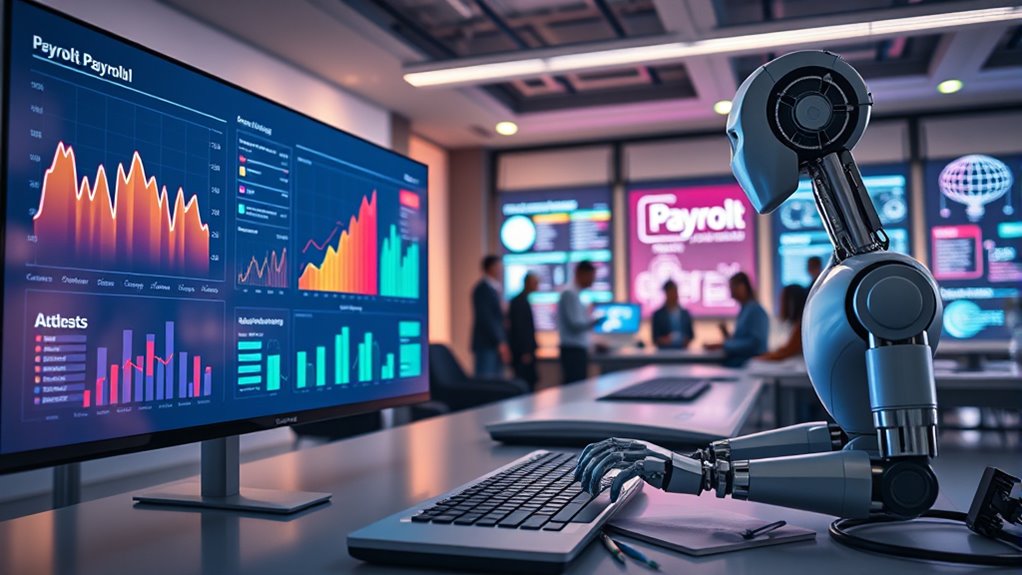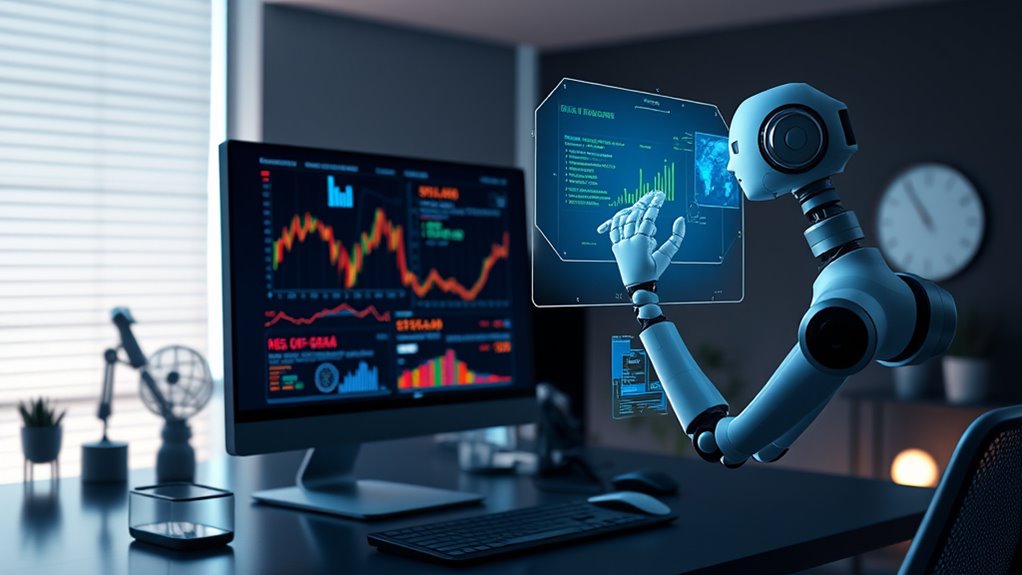AI for automating payroll systems helps you handle tasks like data entry, calculations, and compliance checks seamlessly. It improves accuracy, reduces errors, and speeds up payroll processing, saving you time and effort. AI also guarantees your compliance stays up-to-date by monitoring regulations in real-time and providing insights for better resource planning. By automating routine tasks, you can focus on strategic decisions—continue exploring how AI can transform your payroll processes more effectively.
Key Takeaways
- AI automates routine payroll tasks, reducing errors and increasing processing speed.
- Real-time compliance monitoring ensures adherence to evolving legal regulations.
- Predictive analytics forecast payroll costs and identify trends for better resource planning.
- AI enhances employee self-service and chatbot support, improving the overall payroll experience.
- Increased investment in AI transforms payroll into a strategic function, enabling proactive management.

As organizations increasingly adopt AI, automating payroll systems has become a game-changer for efficiency and accuracy. You’ll notice that with AI integration, routine tasks like data entry, calculations, and compliance checks are handled seamlessly, saving you time and reducing costly errors. By automating these repetitive activities, your payroll processes become faster, more reliable, and less prone to human mistakes, which means fewer payroll discrepancies and happier employees.
AI also helps you stay compliant with ever-changing regulations. Automated compliance checks ensure that your payroll adheres to legal standards at all times. Real-time monitoring of payroll data allows you to identify and correct potential issues immediately, reducing the risk of penalties. Additionally, AI generates exception reports that highlight anomalies, empowering you to address compliance concerns proactively. As regulatory updates roll in, AI systems adapt quickly, keeping your payroll management aligned with the latest rules without manual intervention.
AI ensures payroll compliance through real-time monitoring, automatic updates, and proactive anomaly detection, reducing penalties and manual effort.
Predictive analytics is another powerful feature AI brings to payroll. You gain access to forecasting tools that project payroll expenses with high accuracy, enabling better resource planning and budget management. These insights help you anticipate future payroll costs, identify trends, and make informed decisions, giving your organization a strategic edge. Moreover, AI-driven payroll software provides actionable data and insights into payroll trends, helping you optimize processes continually.
Investment in AI technologies is growing rapidly, with most businesses planning to increase their AI budgets over the next few years. This shift is transforming payroll from a purely transactional function into a strategic asset. You’ll find AI being implemented across various payroll aspects, from automating routine operations to delivering real-time projections and forecasts. This evolution enhances the overall efficiency of payroll management and provides a competitive advantage by freeing up your team to focus on higher-value tasks.
In a hybrid work environment, AI addresses remote work challenges by streamlining employee self-service. Chatbots assist employees with payroll-related questions, reducing the workload on HR and payroll teams. This improves the employee experience while maintaining accurate and timely payroll processing. Overall, AI’s role in payroll management is set to expand further, making payroll systems more intelligent, responsive, and strategic. By 2025, AI will be an integral part of payroll operations, helping you make better decisions, ensure compliance, and optimize your workforce management with compliance monitoring and speed.
Additionally, leveraging automation in data entry minimizes human errors and increases processing speed.
Frequently Asked Questions
How Secure Is AI Handling Sensitive Employee Data?
You’re probably wondering how secure AI handles sensitive employee data. While AI can enhance security through fraud detection and monitoring, data breaches remain a concern, with 60% experiencing cyber breaches recently. You need strong protection measures like encryption and multi-factor authentication, plus compliance with regulations like GDPR and CCPA. Implementing ethical, transparent AI practices and integrating systems carefully also help safeguard data, reducing risks and maintaining trust.
Can AI Adapt to Changing Payroll Regulations Automatically?
Ever wonder if AI can keep pace with ever-changing payroll laws? The answer is a resounding yes. Your AI system continuously monitors legal updates, automatically applying new regulations and flagging discrepancies. It learns from every payroll cycle, refining its accuracy. With real-time updates and automated auditing, your payroll stays compliant effortlessly. This adaptive power guarantees you’re always ahead of compliance risks, even as rules evolve rapidly.
What Are the Costs Associated With Implementing AI Payroll Systems?
You’ll find that implementing AI payroll systems involves substantial costs. Initial setup can range from $10,000 for basic setups to over a million for complex, customized solutions. You’ll also pay for data management, infrastructure, and skilled talent, with ongoing expenses like maintenance, security, and software updates. Expect to invest in training, consulting, and system upgrades to guarantee your payroll remains accurate, compliant, and efficient over time.
How Do AI Systems Handle Payroll Discrepancies or Errors?
You want to know how AI systems handle payroll discrepancies or errors. They detect issues in real-time, analyze data for patterns, and flag anomalies quickly. AI also cross-references information to verify accuracy, identifies root causes, and suggests corrections. By proactively addressing errors, preventing fraud, and ensuring compliance, AI maintains data integrity, enhances transparency, and streamlines workflows—making payroll management more accurate, reliable, and efficient.
What Training Is Required for Staff to Operate AI Payroll Tools?
You need to guarantee your staff receives thorough training on AI payroll tools. This includes understanding basic AI concepts, how to navigate the software, and using generative prompts for automation. They should also learn data interpretation, troubleshooting, and ethical considerations. Providing ongoing training and resources helps your team stay updated on new features and best practices, ensuring smooth operation and maximizing the benefits of AI in payroll management.
Conclusion
By now, it’s clear that AI can revolutionize your payroll processes, making them faster, more accurate, and less error-prone. Imagine how much time and stress you’ll save when automation handles calculations and compliance for you. Isn’t it time you embraced this technology to streamline your payroll system? With AI on your side, you’ll stay ahead of the game and focus more on growing your business rather than wrestling with paperwork.











